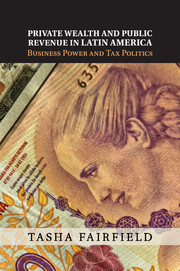Crossref Citations
This Book has been
cited by the following publications. This list is generated based on data provided by Crossref.
Fairfield, Tasha
and
Charman, Andrew
2015.
Applying Formal Bayesian Analysis to Qualitative Case Research: An Empirical Example, Implications, and Caveats.
SSRN Electronic Journal,
2015.
Books Received.
Journal of Latin American Studies,
Vol. 47,
Issue. 4,
p.
887.
Farrell, Henry
and
Newman, Abraham L.
2015.
Structuring power: business and authority beyond the nation state.
Business and Politics,
Vol. 17,
Issue. 3,
p.
527.
Culpepper, Pepper D.
2015.
Structural power and political science in the post-crisis era.
Business and Politics,
Vol. 17,
Issue. 3,
p.
391.
Fairfield, Tasha
2015.
Structural power in comparative political economy: perspectives from policy formulation in Latin America.
Business and Politics,
Vol. 17,
Issue. 3,
p.
411.
Tomashevskiy, Andrey
2015.
Capital Preferences: International Capital and Government Partisanship.
International Studies Quarterly,
p.
n/a.
Dorlach, Tim
2015.
The prospects of egalitarian capitalism in the global South: Turkish social neoliberalism in comparative perspective.
Economy and Society,
Vol. 44,
Issue. 4,
p.
519.
Abdelal, Rawi
2015.
The multinational firm and geopolitics: Europe, Russian energy, and power.
Business and Politics,
Vol. 17,
Issue. 3,
p.
553.
Emmenegger, Patrick
2015.
The long arm of justice: U.S. structural power and international banking.
Business and Politics,
Vol. 17,
Issue. 3,
p.
473.
Anria, Santiago
and
Niedzwiecki, Sara
2016.
Social Movements and Social Policy: the Bolivian Renta Dignidad.
Studies in Comparative International Development,
Vol. 51,
Issue. 3,
p.
308.
Newman, Abraham
and
Posner, Elliot
2016.
Structuring transnational interests: the second-order effects of soft law in the politics of global finance.
Review of International Political Economy,
Vol. 23,
Issue. 5,
p.
768.
Gerring, John
and
Cojocaru, Lee
2016.
Selecting Cases for Intensive Analysis.
Sociological Methods & Research,
Vol. 45,
Issue. 3,
p.
392.
Fairfield, Tasha
and
Jorratt De Luis, Michel
2016.
Top Income Shares, Business Profits, and Effective Tax Rates in ContemporaryChile.
Review of Income and Wealth,
Vol. 62,
Issue. S1,
Fairfield, Tasha
and
Garay, Candelaria
2017.
Redistribution Under the Right in Latin America: Electoral Competition and Organized Actors in Policymaking.
Comparative Political Studies,
Vol. 50,
Issue. 14,
p.
1871.
Landherr, Anna
and
Graf, Jakob
2017.
Neoliberale Kontinuität im politischen Wechselwind.
PROKLA. Zeitschrift für kritische Sozialwissenschaft,
Vol. 47,
Issue. 189,
Castañeda, Néstor
2017.
Business Coordination and Tax Politics.
Political Studies,
Vol. 65,
Issue. 1,
p.
122.
Siewert, Markus B.
2017.
Neue Trends in den Sozialwissenschaften.
p.
239.
Liby Alonso, Martin
2017.
In the Shadow of the past Political Learning and Boom-Time Restraint in Evo Morales's Bolivia (2006-2013).
SSRN Electronic Journal,
Clark, Timothy David
2017.
Rethinking Chile’s ‘Chicago Boys’: neoliberal technocrats or revolutionary vanguard?.
Third World Quarterly,
Vol. 38,
Issue. 6,
p.
1350.
Gerring, John
2017.
Qualitative Methods.
Annual Review of Political Science,
Vol. 20,
Issue. 1,
p.
15.





